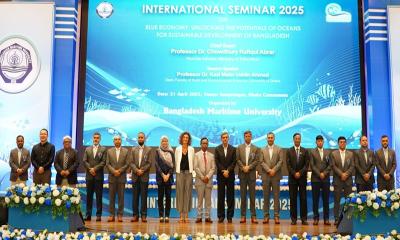-5 state-owned commercial banks, 5 private commercial banks
According to a Bangladesh Bank (BB) report, out of 61 banks in Bangladesh, only 10 banks have high non-performing loans (NPLs) which are 71% of the country's total defaulted loans. Among these 10 banks, five are state-owned commercial banks, and the remaining five are private commercial banks. There was a time when discussions about defaulted loans were mainly about public sector banks. But private banks are also now becoming part of the discussion. According to the data of the central bank, the provision deficit in the banking sector increased by Tk 4 thousand 963 crore between April and June.
By the end of March this year, the provision deficit in this sector stood at Tk 26 thousand 586 crore. According to data obtained from Bangladesh Bank (BB), the total non-performing loans in the banking sector by the end of June stood at Tk 2,11,391 crore, which is 12.56% of the total outstanding loans. However, the default loans of top 10 banks were Tk 1,49,200 crore, which is 70.58% of the total.
According to the data of BB, the largest share of classified loans is from state-owned commercial banks (Tk 1 lakh 2 thousand 483 crore taka or 32.77 percent), specialized banks (Tk 5 thousand 756 crore taka or 13.11 percent), private commercial banks (Tk 99 thousand 921 crore or 7.94 percent) and foreign commercial banks have a loan of Tk 3,229 crore or 4.74 percent.
Dr Zahid Hussain, the former Chief Economist of World Bank's Dhaka office, said that the figures of non-performing loans presented in Bangladesh Bank's report are much less than the actual amount. He stressed that banks should not, under any circumstances, allow NPLs to grow further. “We have implemented a liberal model for managing NPLs, rescheduling loans repeatedly and allowing one-time defaulters to regularize by making partial payments. Time has come to take a tougher approach against large and repeated defaulters.”
He suggested taking initiatives to improve debt recovery. Recovery can be achieved in two ways: through the courts, although this is a lengthy process, or through an alternative resolution process. It is up to the central bank or the government to decide how to proceed.” Fahmida Khatun, executive director of the Center for Policy Dialogue (CPD), said that the banking sector has been steadily declining since 2008. She highlighted financial irregularities such as giving loans based on fake documents, giving loans to non-existent entities and embezzlement of funds over the past 15 years.
The banking sector of the country has gone under the control of a certain group and the situation is getting worse. Nevertheless, there has been a lack of effective measures to address these issues in recent years, he noted. Fahmida also speculated that some of this money may have been smuggled abroad, and a portion may have been reinvested in the domestic economy.
ZH






